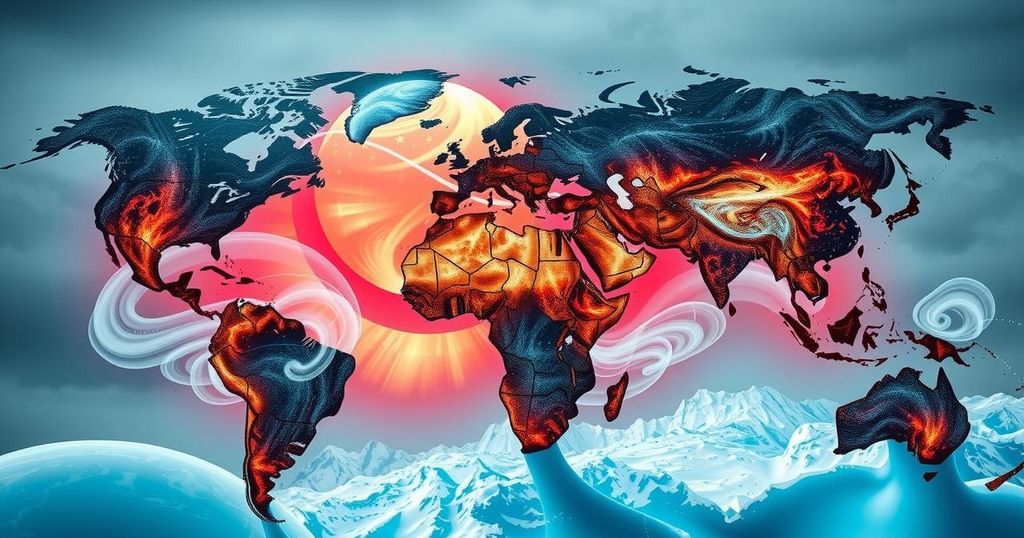The year 2024 is projected to be the warmest on record, continuing a trend of extreme heat fueled by human activities. Greenhouse gas levels have reached alarming highs, leading to severe weather events worldwide. UN Secretary-General António Guterres and WMO officials emphasize the urgency for nations to reduce emissions drastically and prepare for future climate challenges, with a focus on enhanced early warning systems and the International Year of Glacier Preservation in 2025.
The World Meteorological Organization (WMO) has projected that the year 2024 will set a new record as the warmest year globally, finishing off a decade characterized by extraordinary heat driven by human activities. The concentration of greenhouse gases continues to escalate to unprecedented levels, thereby intensifying future warming trends. United Nations Secretary-General António Guterres emphasized the alarming reality of climate breakdown, urging nations to significantly reduce emissions by 2025 and transition towards renewable energy sources.
In anticipation of the consolidated global temperature findings for 2024, scheduled for release in January 2025, the WMO’s comprehensive report on the state of the global climate will be available in March 2025. The current ongoing decade has already recorded the top ten hottest years in history, including 2024, underscoring the immediate need for urgent action to combat climate change. WMO Secretary-General Celeste Saulo remarked that this year has displayed unprecedented climate extremes manifested in frequent and severe extreme weather events worldwide.
Extreme weather conditions, including record-breaking rainfall and devastating flooding, have generated significant loss of life across multiple nations. Severe tropical cyclones and extreme heat waves, with temperatures soaring above 50°C, have caused widespread destruction, stressing the importance of the WMO’s “Early Warnings for All” initiative. This initiative aims to enhance climate resilience and facilitate the global response to the challenges posed by climate-related risks.
The year 2025 will also place a particular emphasis on the cryosphere, coinciding with the International Year of Glacier Preservation, which is being organized through collaborative efforts led by UNESCO and WMO. Reports from the WMO substantiated the escalating pace of climate change and its extensive repercussions on sustainable development, corroborated by the findings from World Weather Attribution, illustrating that climate change intensified a substantial number of extreme weather events leading to extensive fatalities.
A focused discussion took place among experts from diverse international organizations, countries, and academic institutions to devise a coordinated framework aimed at addressing the increasing risks associated with extreme heat. These deliberations were in response to the UN Secretary-General’s urgent call for concerted action regarding extreme temperature threats. The WMO is dedicated to preserving public health through enhanced climate services and timely early warning systems as it approaches its 75th anniversary in 2025, facilitating global monitoring and proactive measures to mitigate climate change impacts.
The backdrop to the dire warnings about climate change stems from over a decade of rapidly increasing global temperatures and extreme weather events. The World Meteorological Organization (WMO) regularly reports on the state of the climate, revealing how human activities, particularly greenhouse gas emissions, have drastically altered weather patterns. The situation has reached a critical point with 2024 set to be the warmest year recorded, escalating the already urgent discussions around climate action and international cooperation.
In summary, the findings presented by the WMO illustrate an unprecedented era of climate extremes, marking 2024 as the hottest year on record. This alarming trend necessitates immediate global action to reduce greenhouse gas emissions and enhance climate resilience. With the upcoming focus on glacier preservation and a commitment to early warning systems, the WMO aims to address the escalating climate crisis effectively, emphasizing the shared responsibility towards establishing a sustainable future.
Original Source: wmo.int






